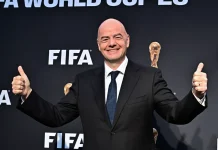The adoption of the modern human rights agenda by FIFA was officially done in 2017, and this is progress toward the sharing of the Guiding Principles of the United Nations in business and human rights. The framework necessitated FIFA to stop, ameliorate and rectify harms to human rights resulting out of their operations or arrangements. In subsequent bid documents of large tournaments, such as the 2026 FIFA Men World Cup, there were clauses requiring the host nations to guarantee civil liberties, labor rights, non-discrimination, and the protection of the freedom of expression in all affairs related to the tournament the host country is hosting.
The three countries selected to co-host the 2026 World Cup—the United States, Canada, and Mexico—had to promise to uphold human rights. These pledges were not limited to the stadiums, as they also covered migrant workforce conditions, freedom of opposition, press entry and marginal populations. The Human Rights & Anti-Discrimination team of FIFA had been assigned the responsibility of overseeing the compliance and engaging the stakeholders during the preparatory process.
Compliance Structures and Promotional Campaigns
Institutionally, FIFA introduced accountability channels within its organization; such as grievance channels, due diligence reviews, in an effort to stop contravention of rights in the organization process of events. Publicity campaigns were initiated to exude a sense of inclusivity as slogans with messages such as “No Discrimination” were used on an international tournament. The Club World Cup 2025 was marked as a stage of tolerance and respect which highlights how FIFA is dedicated to diversity.
Nevertheless, the extent and success of such mechanisms were again questioned in the year 2025. Critics have argued that symbolic actions are non-binding, especially when it comes to deciding on potentially hostile host governments, or political sensitivities where FIFA may have little power to act.
Host Country Contradictions and Emerging Accountability Gaps
The United States and Immigration Policy Criticism
Controversies surrounding the United States, especially on the issue of immigration enforcement, have rendered the build-up of the 2026 World Cup controversial. Excessive detentions, restricting asylum seekers the chance to appear before a court of law, and increased deportations have elicited the condemnation of like-minded groups that are of the opinion that the U.S. federal government has gone too far. Human Rights Watch and other monitors report that border enforcement practices in 2025 have grown more aggressive, with implications for international visitors, especially those from Latin America, Africa, and the Middle East.
These developments run counter to FIFA’s stated human rights expectations for host nations. Nevertheless, FIFA has been quiet on its social activity. The spokespersons keep repeating that the organization is committed to what is known as constructive dialogue but is not keen on making direct criticism of national policy. This cautious approach is irritating to civil society coalitions composed of a collection of 90 U.S. based organizations who prepared a joint memorandum to FIFA in the hope that intervention would take place before the tournament is permitted to endorse acts of discrimination.
2034 World Cup and Controversial Saudi Arabia Bid
At the same time, the move to give Saudi Arabia the 2034 FIFA Men World Cup has given rise to legal and reputational repercussions to the body. In January, 2025, an association of international lawyers raised a formal complaint under the FIFA human rights policy and argued that the Saudi bid was not in line with other core liberties such as the rights of women, labor rights and freedom of expression.
The complaint presented the frequent visits by FIFA president Gianni Infantino to Saudi Crown Prince Mohammed bin Salman and said that the bidding process was both opaque and determined in advance. According to critics, FIFA is violating its own pledges on human rights by making the move without credible safeguards in place. Although FIFA passes the receipt of the complaint, its reply (which is on future engagement opportunities) was criticized to be inadequate.
Diminished Messaging and Fan Discontent
Shifting Campaign Strategies at Tournaments
Explicit anti-racism and anti-discrimination messages were dialled down on FIFA messaging at the 2025 Club World Cup, held in the United States. Such slogans promoting inclusion were replaced with generalized branding where all the world unites under the term Football. Players unions, fan networks, and human rights activists criticized such a strategic change as a step back after the strides post 2022 Qatar World Cup.
Unlike other sporting events that witnessed a series of major actions on racism and LGBTQ + rights, observers considered the lack of such statements during the tournament a step to prevent any political tension in the country hosting a polarized nation. Captains of some national teams are reported to have sought a more clear direction when it comes to wearing armbands or a kind of gesture. The ambiguous responses given by FIFA alienated the athlete activists even more who wanted to know what was going on.
Calls for Greater Transparency and Independent Oversight
The rift between the proclaimed and actual practices has gone to give rise to a clamour of reforms. Fans and the advocacy organizations demand greater transparency of FIFA decision-making, such as publication of human rights risk assessments, which should disclose detailed risk assessments, and stability in application of host obligations.
They need the establishment of a Human Rights Oversight Body that will be fully independent in its work, with the power to audit the effects of tournaments and provide recommendations that will be binding. The current grievance mechanism established by FIFA is alleged to be inadequate in that it is not independent, as well as not publicly reported. The task still remains to factor in credible enforcement in a governance system that has historically been one of political compromise and commercial interests.
Realpolitik, Governance Challenges, and Strategic Inertia
Structural Constraints and Business Imperatives
The reality of the operation of FIFA in practice reduces its capacity to hold its own regarding the human rights mandate set to it. The pressure to conduct good relations with host governments, secure business alliances, and accomplish flawless staging of events regularly results in compromises. In cases when international governing body FIFA has a stake in both finances/logistics and regimes that curtail its human rights, it lacks the weight to pressure them into changes.
Internal governance structures contribute to the problem. Despite reforms following the 2015 corruption scandal, FIFA’s executive leadership retains substantial discretion in managing grievances and setting priorities. Critics argue that the lack of checks and balances permits human rights to be deprioritized in favor of political continuity.
This inertia is visible in FIFA’s selective enforcement. Countries with geopolitical weight or financial leverage—such as the U.S. or Saudi Arabia—often receive deferential treatment, while smaller nations face greater scrutiny. This inconsistency diminishes FIFA’s moral authority and reinforces skepticism about its commitment to reform.
Strained Alliances with Civil Society and Athletes
Disillusionment with FIFA’s human rights record has eroded trust among influential stakeholders. Players increasingly view FIFA’s position as detached from the lived experiences of marginalized communities. In private discussions, several athletes have expressed concern that speaking out might be discouraged or penalized, particularly when issues intersect with national laws.
Independent organizations have begun to fill the advocacy vacuum. Networks like the Centre for Sport and Human Rights are conducting parallel monitoring of host nation practices, creating alternative frameworks for accountability. Their presence reflects both a rising demand for oversight and a perceived vacuum within FIFA itself.
Constructive Pathways Toward Accountability and Reform
Nonetheless, FIFA enjoys universal power that cannot be ignored, and can be used to bring about gradual changes regarding human rights. The capacity to constitute, dictate the moods in the society, and influence contractual norms gives it a chance to entrench human rights protections in a more comprehensive manner-in case it uses this opportunity.
More powerful enforcement in the contractual form equivalent to the de facto standards and benchmarks, which result in the right to be measured and verified by a third party and face sanctions in case of non-adherence, may be considered as a part of the tournaments bidding contracts. The partnership of FIFA with the United Nations bodies and external monitoring organizations can build more legitimacy and lift the strain off internal systems.
Training programs focusing on member federations, sponsors, and host committees would institutionalize the awareness of rights and best practices when it comes to the operations. Such moves may become compulsory by the general FIFA-related events.
Aligning Governance Reform with Rights Integration
The current governance reforms by FIFA are a chance to take human rights further into the DNA of FIFA. The intensification of autonomy of its Ethics Committee, the presence of whistleblower protection, and participation of stakeholders in oversight agencies would go a long way in raising credibility.
Instead of abandoning controversial host environments, FIFA can call a policy of conditional engagement meaning that your privileges to hosting can be conditional based on the ability to show improvements in certain rights areas. Although it is not easy, this strategy makes moral leadership practical.
The sustainability of the FIFA reputation will ultimately not only be based on the competence of the body to organize world class tournaments but on how it will need to handle the convergence of sport and society.
The contradiction between the open promises and limited action of FIFA points to a wider reality about international governance: that institutions with transnational jurisdiction have to play out the crevices of politics, trade and morality. The future of FIFA as a serious actor performing the social role of accountability or a responsive agent in a globalised society will not only contribute to football as an industry, but also to the construction of standards in general.













